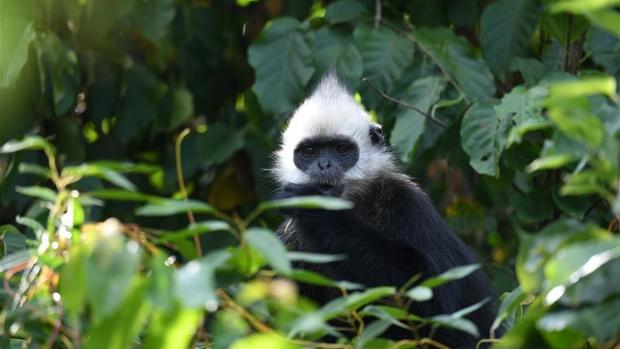 A white-headed langur forages on a hillside in the Banli subarea of the Guangxi Chongzuo national nature reserve in Chongzuo city, south China's Guangxi Zhuang autonomous region, July 13, 2020. White-headed langurs are one of the rarest primates on the planet. (WU SHUJUN / XINHUA)
A white-headed langur forages on a hillside in the Banli subarea of the Guangxi Chongzuo national nature reserve in Chongzuo city, south China's Guangxi Zhuang autonomous region, July 13, 2020. White-headed langurs are one of the rarest primates on the planet. (WU SHUJUN / XINHUA)
China will complete a national monitoring network for biodiversity conservation this year as it prepares to host a crucial United Nations conference on the subject, the Ministry of Ecology and Environment said.
In addition to legislation on biodiversity conservation, the ministry will strive to enact a law on protected land.
To ramp up supervision over protected land, a special guideline on the management of "red line" boundaries that protect conservation areas will also be drafted, Ecology and Environment Minister Huang Runqiu said in his annual work report released last month.
Based on enhanced monitoring, the environmental watchdog will roll out assessment appraisals for the red line management system, he added.
According to the Ministry of Ecology and Environment, red lines that encircle more than 25 percent of the country's land have been mapped out, protecting the vast majority of the country's key species and ecosystems
According to the ministry, red lines that encircle more than 25 percent of the country's land have been mapped out, protecting the vast majority of the country's key species and ecosystems.
ALSO READ: China holds high banner of biodiversity
This year, China will complete building a nationwide monitoring network, one of its major national biodiversity conservation projects, Huang said.
Cui Shuhong, director-general of nature and eco-conservation at the ministry, said 749 observation areas have been set up across the country. The areas are capable of providing more than 700,000 pieces of data every year.
The ministry has invested a total of 400 million yuan (US$61.9 million) in biodiversity surveys and assessments and the observation network, he said at a news conference in January.
The work, involving more than 2,000 researchers, has helped give a clear picture of the country's biodiversity conservation.
Huang also stressed the country's determination to host a successful United Nations Biodiversity Conference-the 15th meeting of the Conference of the Parties to the Convention on Biological Diversity or COP 15-in Kunming, Yunnan province.
The conference was originally scheduled for October last year, but it was postponed to May because of the COVID-19 pandemic. There are still uncertainties over when it will be held. The theme of the conference is Ecological Civilization-Building a Shared Future for All Life on Earth.
Ecological civilization is a concept that China has long promoted to achieve balanced and sustainable development that features harmonious coexistence of nature and humanity.
READ MORE: Full text: Beijing Call for Biodiversity Conservation and Climate Change
The key task of COP 15, a biennial gathering, is to elaborate on the post-2020 global biodiversity framework and identify protection goals for the next decade.
China will promote the negotiation process for the framework by proactively preparing for the conference. "We will strive to ensure that it will be a milestone conference," Huang said.


